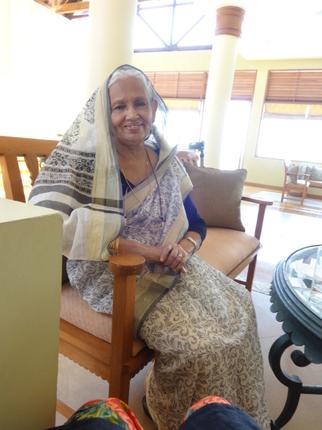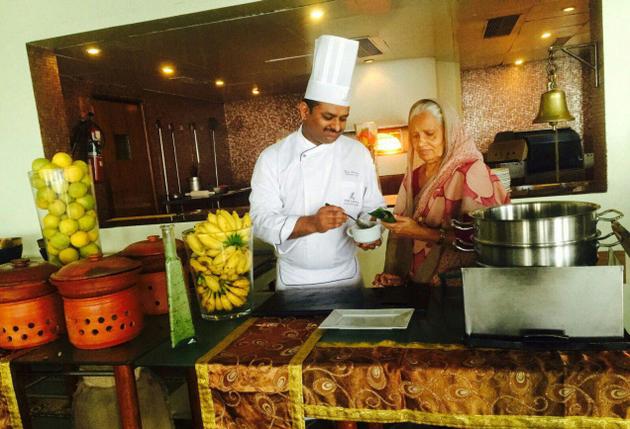
Ummi Abdulla is the matriarch of Moplah cuisine
She has written six cookbooks, uploaded YouTube videos on cookery and travelled the world to showcase the best of Moplah cuisine and teach chefs the intricacies of pathiri and mutta surka. Ummi Abdulla, the queen of Moplah cuisine, has done all that and more but the octogenarian does not want to put up her feet and take a break from the kitchen. She is raring to and prove that anyone, even you and me, can make unnakaya and mutta mala if you know how to go about it.
“Bananas and eggs are combined in different ways to make a platter full of delicacies. It is one of the hallmarks of our cuisine. We also use garam masala, perum jeerkam (fennel) and coconut in many of our dishes,” says Ummi, who lives in Kozhikode.
Fragrant with the spices of the Malabar coast and enriched with memories of her grandmother’s kitchen, Ummi’s delicacies have made her a household name among foodies. “I cook every day, something I began doing from the time I got married at the age of 14. Now, I find it difficult to stand for long hours. So I have a help who works under my direction. I am still experimenting and learning and trying to reproduce the flavours of my Ummumma (grandmother’s) kitchen,” says the octogenarian with a smile.
Growing up in a join family with 10 siblings meant that her mother hardly got any time in the kitchen. But Ummi’s grandmother ruled over the kitchen and it was she decided the menu and cooked the special dishes to be served on festive occasions. “She was a terrific cook but she hated anyone watching her cook and was not too keen on teaching anyone either. She insisted that if someone watched her making mutta mala, for instance, it would all break and get spoilt. She would not even permit the servants to be around. So she would close the door when she was cooking,” recalls Ummi, laughing at the memories.
But little Ummi was allowed to watch her grandmother create the intricacies of Moplah cuisine like mutta mala, adukku pathiri, panchara patta, and so on.
Years later, after Ummi married and began her own home, her husband, a foodie, would request her to cook fish biriyani and the other delicacies of the Malabar coast and that is when Ummi began trying to recreate the flavours of her grandmother’s kitchen.
Eventually she became such an expert that chefs came knocking at her door to help them infuse the aroma of ethnic cuisine into their menus. So from catering for the stars and making pickles for la-di-dah restaurants in Chennai, Ummi began travelling to teach chefs the fine points of Moplah cuisine.
“All of them want me to teach them how to make pathiri, prawn biriyani and unnakaya. I also teach them mutta mala because it is such an important item in our cuisine. But not everyone will like it because it has a very strong ‘eggy’ taste. Otherwise you must have it pinjanathappam, a kind of steamed pathiri,” she says.
Her favourite, she says, is the humble ari unda. “I love it and so do my two daughters. Even now, when I crave for some, I make it and store it,” she says.
Now Ummi has come up with her own takes on the age-old recipes. Since Moplah cuisine is so full of non-vegetarian delicacies, many of the chefs have requested her for vegetarian recipes for their customers.
“That is how I came up with ulli ada, my own take on the kozhi ada. Instead of chicken, ulli ada has onion and coconut. I think of a name and then I invent my own recipe. I keep experimenting till I come up with a winner,” she says.
According to her, one of the most difficult eats to make is panchara patta, a delicacy that has to be made two days in advance before it can be served. “Rice flour and egg are whipped till bubbles are formed. The bubbles are removed with a ladle and poured into hot oil. The deep fried bubbles look like a honeycomb. In the same way, the entire mixture is fried. The layers of panchara patta are kept in a colander to drain because it is very oily. After two days, it is crumbled, sugar is sprinkled on it and it is eaten with banana, like puttu,” she explains patiently.
Ummi wonders why youngsters don’t want to try out the regional goodies that India has instead of gorging on pizzas and burgers. So proud is she of her culinary heritage that she does not miss any opportunity to showcase it. “Recently a relative of mine got married into a family from Hyderabad. When they came to our house, I made our biriyani that is made with tiny khaima rice, the smaller the better. I know that Hyderabadis favour the long grained rice to make biriyani but I thought since they were travelling to Kerala, they should get an opportunity to taste our biriyani. As expected, they told me that they enjoyed the biriyani but found the rice used to be very different,” she narrates.
She says she prefers to stick to the ingredients that were used in the recipes traditionally. “So I have used only coconut oil for dishes that have fish. Somehow it tastes better. But for other recipes, I now use refined oil too.”
Ummi is now gearing up for a coffee table cookbook that her granddaughter Nazneen is compiling. “She spent a couple of weeks with me, photographing the dishes and getting the recipes. In addition, she kept asking me for stories for the recipes,” she says with a fond smile.
The stories and the food keep coming.

Taste of tradition
Ummi was at The Leela, Kovalam to teach the chefs the best of Moplah cuisine. “Over the last two days, she has been teaching us a wide variety of her specials like unnakaya, biriyanis, mutta mala, pathiri and so on. We will be including some of the dishes in the buffet that we serve for lunch and dinner,” says executive chef Roy Satheesan.
Ummi’s top seven
Biriyani
Made of kaima rice, the biriyani could be made of chicken, mutton, fish or prawns. Generous amounts of ghee and spices that are native to the Malabar coast are used to make it.
Unnakaya
Ripe banana (nendra pazham of the right consistency) is steamed, mashed, shaped into oval-shaped nuggets and filled with sweetened coconut, egg and raisins. Then it is deep fried. Ummi says this has been enjoyed in all the places she has served it.
Pathiri
Made with rice flour, it is cooked on a tava and served with chicken, mutton or fish curry. There are several varieties of pathiri.
Kaya ada
This was a speciality of her grandmother. Rice flour, jaggery and banana, are mixed and filled into banana leaves shaped into cones. Then it was steamed. Healthy and tasty.
Mutta mala
It is made of egg yolk poached in sugar syrup.

Kadukka
Mussels, stuffed and deep fried.
Aleesa
This used to be a must for all Moplah weddings. Made with husked wheat, mutton or chicken, and lightly spiced, it is like a porridge. It was served first for the wedding feast. Then mutta mala was served and last of all came the biriyani.
source: http://www.thehindu.com / The Hindu / Home> Features> MetroPlus> Food / by Saraswathy Nagarajan / Thiruvananthapuram – September 09th, 2015








